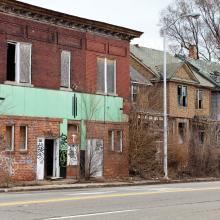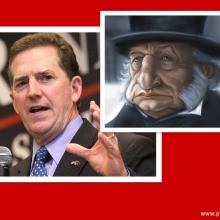the poor
On Saturday, more than 2 million people gathered virtually to “call for a radical redistribution of political and economic power” as part of the Mass Poor People’s Assembly and Moral March on Washington Digital Justice Gathering.

alisafarov / Shutterstock
THE STATE OF THE U.S. working class gives us many reasons to feel discouraged. Wages have stagnated even as productivity has increased significantly. With independent contracting and the “gig economy,” jobs have become less secure. The Bureau of Labor Statistics predicts that most job growth will be in low-paying fields, such as home health care and food service. Union membership, a central measure of the social cohesion and political power of the working class, has fallen to 11 percent, down by almost half since the early 1980s.
Medical research links economic frustration to rising death rates among middle-aged whites and addiction among younger adults. Long encouraged to believe that hard work would translate into economic stability, working-class people have, as one of the researchers, Angus Deaton, put it, “lost the narrative of their lives.”
Two important shifts in how people think about class and work suggest reasons for cautious optimism. They also suggest possible roles for faith-based organizations.
The first reason might seem counter-intuitive: Americans in general, and younger Americans in particular, increasingly identify themselves as working class. Gallup polls over the past 15 years show that the number of Americans who identify themselves as upper-middle or middle class has fallen by 12 percent, while the number who identify as lower or working class has risen by 15 percent. More than 56 percent of millennials identify as working class, compared with 44.2 percent of baby boomers. Even younger adults with college degrees—which pollsters often use to identify respondents as middle-class—find themselves working part-time, low-wage jobs, struggling with student loan debt, and unable to afford the traditional markers of adulthood, such as home ownership. These surveys (and this year’s political campaigns) suggest growing anger over economic inequality, but as community organizers know, frustration and anger can inspire action.
Screenshot via Speaker Paul Ryan / Youtube
While Speaker of the House Paul Ryan’s speech to a committee room full of interns on March 23 focused on restoring civility to political discourse, the speech also contained a surprising twist. Ryan, who has publicly endorsed the writings of Ayn Rand, admitted, “I’m certainly not going to stand here and tell you I have always met this standard” of civility.
During a broad conversation on how to overcome poverty at Georgetown University last week, President Barack Obama made a few comments about how Fox News talks about poor people. Here’s what he said:
“ … over the last 40 years, sadly, I think there’s been an effort to either make folks mad at folks at the top, or to be mad at folks at the bottom. And I think the effort to suggest that the poor are sponges, leeches, don’t want to work, are lazy, are undeserving, got traction. … I have to say that if you watch Fox News on a regular basis, it is a constant menu — they will find folks who make me mad … They’re like, I don’t want to work, I just want a free Obama phone — or whatever. And that becomes an entire narrative … very rarely do you hear an interview of a waitress — which is much more typical — who’s raising a couple of kids and is doing everything right but still can’t pay the bills.
The United States hosts more than 23,000 payday lending stores, which outnumbers the combined total of McDonald’s, Burger King, Sears, J.C. Penney, and Target stores. These payday lenders do not make conventional loans as seen in most banks, but instead offer short-term loan amounts for short periods of time, usually until the borrower’s next paycheck, hence the name “payday loans.”
While some borrowers benefit from this otherwise unavailable source of short-term and small-amount credit, the payday lending business model fosters harmful serial borrowing and the allowable interest rates drain assets from financially pressured people. For example, in Minnesota the average payday loan size is approximately $380, and the total cost of borrowing this amount for two weeks computes to an appalling 273 percent annual percentage rate (APR). The Minnesota Commerce Department reveals that the typical payday loan borrower takes an average of 10 loans per year, and is in debt for 20 weeks or more at triple-digit APRs. As a result, for a $380 loan, that translates to $397.90 in charges, plus the amount of the principal, which is nearly $800 in total charges.
Setting an away email with no date of return was almost as odd as leaving work and not and knowing when I’d be back. This unexpected time off gave me the opportunity to do everything on my to-do list and spend ridiculous amounts of time at the dog park. Naturally, it also gave me time to catch up on reading and visiting with other furloughed friends. But this past Wednesday I was beginning to feel a bit hopeless about the whole situation.
Scrolling through Facebook I noticed Sojourners updates on its #FaithfulFilibuster and it truly made me ashamed of my hopelessness. I was ashamed because I forgot who was in charge. I was ashamed because I forgot where my hope lies. And I was ashamed because I was so wrapped up in my own struggles of furlough I forgot about the families that were already struggling and now also dealing with a loss of paychecks.
On Thursday I saw another update from Sojourners, and despite the rain, I felt compelled to go check it out. I expected to do nothing but observe and admire faith leaders stepping out to reclaim hope and speak for the millions of silenced voices in this country. However, when I arrived, something different happened. I was asked if I wanted to participate, handed a Bible, and stepped to the podium to read.

Faith, the Poor, and Politics image via www.joshschicker.com
I couldn’t resist: I heard that a singer/songwriter in Atlanta was coming out with an album titled, Faith, the Poor, and Politics. Josh Schicker currently serves as Worship Leader in Mission at North Avenue Presbyterian Church in Atlanta. He’s also an accomplished musician, recording songs and performing at Eddie’s Attic most recently.
Faith, the Poor, and Politics is both catchy and contemplative. It’s spiritual but not in-your-face religious; personal, but not isolated from community. Below, you can read his thoughts on the album and other things in the realm of faith, politics, and culture.
Remember Rep. Paul Ryan’s 2011 budget, The Path to Prosperity? Well, it’s baaa-aaack — and this time the path is smoother and wider and offers a quicker trip to judgment.
Christianity and most of the world’s faith traditions explicitly demand protection for the poor and the preservation of the lives and dignity of all. Well, the Chair of the House Budget Committee, Ryan, high-tails it down his Path, budget rolled in-hand, in the exact opposite direction from those moral commitments.
Bob Greenstein, president of the Center on Budget and Policy Priorities (CBPP), concluded that the Ryan budget “is Robin Hood in reverse — on steroids. It would likely produce the largest redistribution of income from the bottom to the top in modern U.S. history and likely increase poverty and inequality more than any other budget in recent times (and possibly in the nation's history)."
Any responsible budget plan requires a balanced approach that would both increase revenue and reduce spending. This proposal would cut taxes, merely hope for revenue, increase military spending, and slash most everything else that isn’t protected by large corporate interests.
Hearing about the injustice and suffering in our world can be overwhelming. The problems seem so insurmountable. Is it really possible to make a difference?
Well, here's some good news. We already are making a big difference. Consider these statistics cited by Dr. Scott Todd from Live58:
"We used to say that 40,000 children die each day from preventable causes. In the 1990s, that number dropped to 33,000 per day. By 2008, it dropped again to 24,000. Now it is down to 21,000. That means that in a generation we cut that number in half. 1.4 billion people live in extreme poverty today. That's a staggering amount, but let's put those numbers in perspective: In 1981, 52 percent of the world lived in extreme poverty. Today it's 26 percent. Again, that means we have cut the number in half, and we did it in one generation."
Now, if you are anything like me then your reaction to poverty is a mixture of compassion and helplessness. If you're reading the Sojourners blog, then I assume that you already care about the least like I do, and that you know how big the problems are. I often find myself asking: What can I do? What can anyone do? We've heard the bleak statistics before. It's not news that there is a problem.
The news is that there is actually hope for real change.
“The poor will always be with you,” Jesus once said, and for centuries his followers have struggled to understand what he meant.
Or maybe not.
“The poor will always be with you” — especially if you’re not poor — seems straightforward enough: Look around, people ! The poor (and their problems) are very much with us!
Viewed through this kind of realpolitik lens, this verse (and the Bible generally) pose no real interpretive challenges to our reading or our living. The world, regrettably, is simply thus. The poor, alas, will always be with us.

Union Jack mural in disrepair. Image via http://bit.ly/wLwse2.
Gandhi once said that "a nation's greatness is measured by how it treats its most vulnerable." Today, it strikes me that the "Great" in Great Britain should probably be quietly dropped, and replaced with "Abject," "Inadequate" or something equally disparaging.
For that is how the UK is currently treating its most vulnerable — the young, the elderly, the disabled — inadequately, abjectly and without compassion. For the last few weeks, a battle has been raging between the government, the legislature, the Church, organizations, and the general public over a piece of legislation called the Welfare Reform Bill.
The bill is wide ranging in its ‘reforms’, covering a myriad of social security measures – from disability benefits, to welfare offered to the unemployed and their families and children. At a time when austerity and budget cutting is front and center of the government’s agenda, ‘reform’ is a by-word for ‘cutbacks’.
The crux of the legislation is an attempt to distinguish between different categories of "the poor," to weed out the “undeserving” from the “deserving.” Sadly, as can be seen from the uproar that the Bill has caused, this attempt has failed.

Sen. Jim Demint (L) and Ebenezer Scrooge (R) Photos via Wiki Commons,http://bit.ly/Collage by Cathleen Falsani for Sojourners.
Sen. Jim DeMint recently released a plan to cut the federal deficit with $4.2 trillion in spending cuts. And guess what he wants to cut?
Seventy percent of the cuts would come from safety net programs that assist low-income people, including eliminating the earned income-tax credit and child tax credit.
Even an analyst for the American Enterprise Institute objected, saying, "It's comprised completely of spending cuts and no tax increases, but then targets the lower-income programs while sparing the big middle-class programs. They could have designed a spending-cut program that was more balanced …”
The news brought to mind a parable from the mid-1800s.
In the opening scene of Charles Dickens’ A Christmas Carol, Ebenezer Scrooge is approached by two earnest gentlemen. "At this festive season of the year, Mr Scrooge,'' said the gentleman, taking up a pen, ``it is more than usually desirable that we should make some slight provision for the Poor and destitute, who suffer greatly at the present time. Many thousands are in want of common necessaries; hundreds of thousands are in want of common comforts, sir.''
Quit hitting the snooze button.
It’s time for the church to wake up!
According to a Laura Sessions Stepp at CNN.com, evangelical churches are finally acknowledging a trend that statisticians have been tracking for years: young evangelicals are leaving the church in droves.
In the new report, You Lost Me: Why Young Christians Are Leaving Church and Rethinking Faith, Barna Group President David Kinnaman notes a 43 percent drop in Christian church attendance between the teen and early adult years.
Perhaps most intriguing is that research indicates younger people are not only departing from their elders on “social issues,” such as same-sex marriage and abortion, but on wealth distribution and care for the environment, as well.
According to a report in The Christian Science Monitor, three out of four millennials say that wealthy corporations and financiers have too much power and that taxes should be raised on the very wealthy. Two out of three say financial institutions should be regulated more closely.
While the issue of jobs and higher wages remain as important to millennials as they do to older voters, the widening “black hole” of church attendance in the 18-29 age demographic indicates a larger trend — young people are thirsting for social justice, and simply not finding those principles in the pews.
The U.S. Conference of Catholic Bishops (USCCB) released a letter to Congress on Monday concerning unemployment benefits. Bishop Stephen E. Blaire of Toledo, Ohio, the letter's signatory, makes the argument that unemployment benefits are a “right to life” or pro-life issue.
This is a time of “prolonged and pervasive economic pain.” The letter cites the median length of joblessness as 10 months and that there are 4 job seekers for every 1 job opening. Blaire then quotes from Pope John Paul II’s encyclical Laborem Exercens:
The obligation to provide unemployment benefits, that is to say, the duty to make suitable grants indispensable for the subsistence of unemployed workers and their families, is a duty springing from the fundamental principle of . . . the right to life and subsistence.
If Glenn Beck still had that black board, Pope John Paul II might end up receiving the posthumous honor of having a smiling photo added to it.
Here’s the story I tell about how I met my husband, Matthew.
I had left the conservative, sectarian church of my childhood along with their teaching that being Christian mostly meant buying an insurance policy for the hereafter. We were told not to concern ourselves with this world. We need not bother ourselves with the poor, the hungry, the stranger unless of course in doing so we might sell them the eternal insurance policy thus adding a notch to our holiness belt. See, as our hymns suggested, we were the spiritual 1 percent we were all about gold streets and mansions in heaven so the deteriorating sub-standard housing around the corner was not our concern.
Almost 10 years after leaving that form of Christianity and after involving myself quite deeply into issues of social justice I met Matthew, a really cute Lutheran seminary student. On our first date we sat across the booth from each other at el taco de Mexico and talked about social issues and we saw eye to eye on everything. Then he said, “my heart for the poor is rooted in my Christian faith” at which point I looked at him and thought: What are you? Like a unicorn? Some mythical combination of creatures that doesn’t exist in reality? Soon I learned there was a whole world of Christians out there who actually take Matthew 25 seriously. Who believe that when we feed the hungry, cloth the naked, and care for the sick we do so to Jesus’ own self.
This week, the Senate will vote on H.R. 2354, an appropriation bill that will determine the amount of funds we allocate for poverty-related development assistance. There are a number of amendments proposed that will severely cut this aid, which currently helps millions of the world's poorest and most vulnerable. The bottom 1 percent, if you will.
Cain: God Convinced Me To Run For President. OpEd: Whatever Happened To Discipline And Hard Work? Bob Jones III Unplugged. GOP Candidates Hammer Obama On His Iran Policy During South Carolina Debate. Jon Huntsman Blasts "Sound-Bite Campaigning." OpEd: Christian Politics Create Unholy Alliances. Would Cracking Down On Illegal Immigration Really Cut Unemployment? And the Poor Are With Us, However You Count Them.
On November 23, the Congressional Super Committee appointed to reduce the national deficit must decide where to cut $1.2 trillion from the federal budget.
Many of their proposed cuts the Super Committee is contemplating strike fear in my soul -- a visceral forboding of injustice.
That's because the proposed billion-dollar cuts will affect after school tutoring programs, job training for unemployed adults, Head Start and child care programs, energy grants that help low-income families afford heat and many other programs that benefit the least of those among us.
It is for this reason that many organizers, parents, students, community leaders and people of faith will assemble across the nation at noon (in every time zone) on November 16 to form human circles of protection around the buildings of organizations and agencies that have dedicated their lives to helping the poor and are in jeopardy of losing essential funding from the federal government.








